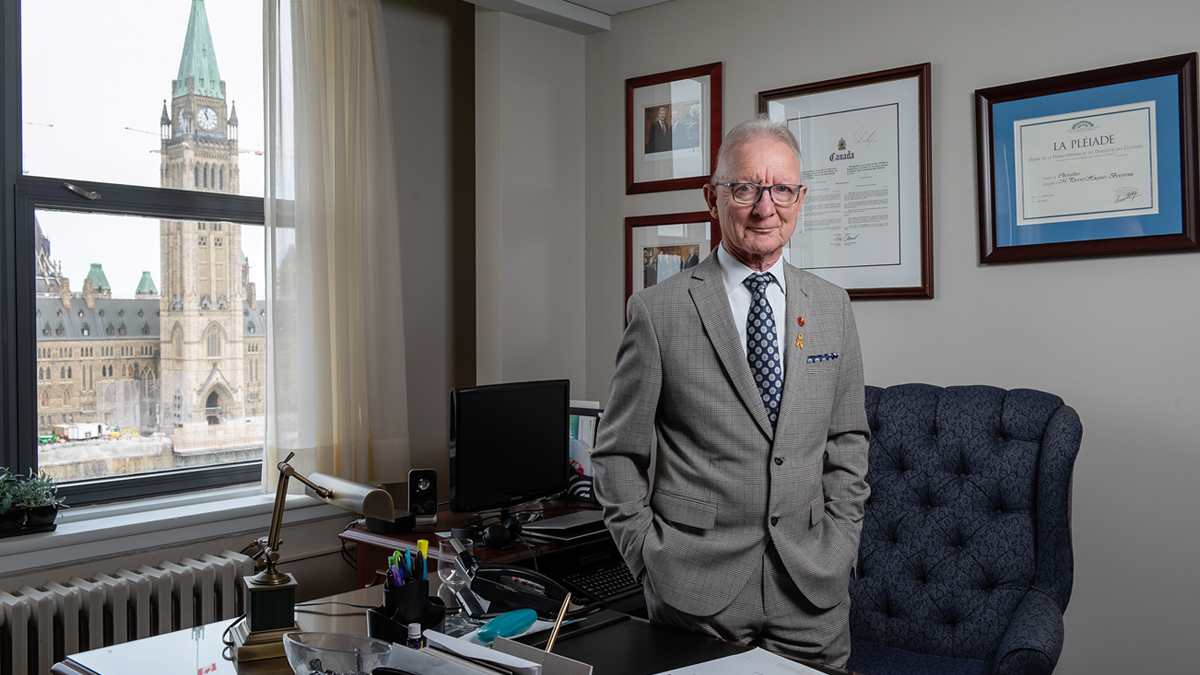Meet Senator Pierre-Hugues Boisvenu

It’s almost impossible to discuss Senator Pierre-Hugues Boisvenu’s work without mentioning his daughter Julie.
Her murder in 2002, when she was just 27 years old, sent him on a life-long mission to protect the rights of victims of crime and their family members.
Since his appointment to the Red Chamber in 2010, he has fought to bring about legislative changes in support of victims.
Senator Boisvenu sat down for an interview with SenCAplus to discuss a few of his legislative victories and how the memory of his late daughter still shapes his work in the Senate.
You’ve been advocating for victims’ rights for almost 20 years. What changes have you seen for victims of crime and their families during this time?
When it comes to victims’ rights, changing course is more like manoeuvring a gigantic ocean liner than a 12-foot rowboat: you can’t change direction quickly. The existing system is complex, so change takes time.
When Julie was murdered 20 years ago, the only government support we received was a $600 cheque. These days, the provinces are doing a better job of supporting victims, but too many still don’t offer any assistance at all. That’s why I keep calling for the federal government to set national standards to ensure that all Canadians who are victims of crime receive at least basic services.

Senator Pierre-Hugues Boisvenu, left, speaks with former prime minister Stephen Harper in 2014. (Photo credit: Office of Senator Pierre-Hugues Boisvenu)
We made huge strides under former prime minister Stephen Harper in terms of the Criminal Code. Around 15 bills were passed between 2006 and 2015 to improve support for victims.
In 2004, you co-founded the Association des familles de personnes assassinées ou disparues (AFPAD), which now has a membership of almost 700 families. How has your organization supported these families?
When Julie was murdered, the victims themselves received assistance. Their family members, however, were not considered victims and therefore received nothing. We created the AFPAD to help families. We organize things like monthly breakfasts or lunch meetings for the families of victims.
Although the Government of Quebec now includes family members and loved ones in its definition of victims, AFPAD’s mission continues as before. I’ve always said that, for victims, silence is a prison. Our organization helps families talk about their tragedies.
You worked for the Quebec government as a senior public servant and deputy minister for more than 30 years. How did that experience prepare you for the Senate?
Considering all the time I spent talking to the media, ministers and the public, as well as organizing and planning, I sometimes feel like my daughter chose me for this role. She knew that I was familiar with the ins and outs of politics after working within the Quebec government and as a deputy minister for 30 years. I knew the right way to make requests and how to put a bill together. I knew a lot about politicians and how to send them a clear message about what we wanted.

Senator Boisvenu speaks at a Senate Committee on Legal and Constitutional Affairs press conference in 2017 following the publication of its report on court delays.

Former senators Norman E. Doyle, left, and Terry M. Mercer, centre, share a moment with Senator Boisvenu during a fact-finding mission on pipelines.
How did Julie’s death and your work with victims’ families inspire you to advocate for a Canadian Victims Bill of Rights?
Within months of Julie’s death, her murderer was arrested and charged, but the Crown attorney never called to let me know. The trial was scheduled in Sherbrooke but later moved to Montreal, and I found out about it by watching the news on TVA. Later, the accused changed lawyers and I heard about it through Radio-Canada.
That’s when I realized that, although the rights of criminals were supported under the Charter of Rights and Freedoms, not one section of it addressed victims’ rights. I met Mr. Harper in 2005 and told him that we needed a bill of rights for victims. Victims needed to be better informed, to be included in court proceedings, and to receive protection and proper restitution.
You have said that this bill of rights needs to be improved. How does the bill you introduced in May 2023, Bill S‑265, the Federal Ombudsperson for Victims of Crime Act, enhance the bill of rights?
As things stand, the right to protection is essentially limited to the physical protection of victims. Recently, however, a case came up where a mother who had murdered her daughter was still posting photos of herself next to her daughter on her Facebook page from prison. The father wrote to us to say that it made no sense for a criminal to be allowed to post photos of her victim on Facebook. We therefore decided to broaden the definition of “protection” to include not only protection of the victim’s life, but also protection of the victim’s privacy and past.

Senator Boisvenu’s two daughters: Julie was murdered in 2002; Isabelle was killed in a car accident almost four years later. (Photo credit: Office of Senator Pierre-Hugues Boisvenu)
Bill S-265 also creates an obligation for the courts to keep victims informed. Once adopted, the bill of rights will offer a stronger and more robust recognition of victims’ rights.
You introduced Bill S-205, An Act to amend the Criminal Code and to make consequential amendments to another Act (interim release and domestic violence recognizance orders). How will this legislation protect victims of domestic violence?
First, a lot of abusers never go to trial or get sent to prison. They are released with a restraining order requiring them to keep their distance from the victim. They are the ones who keep harassing women. This bill will allow judges to require violent partners to wear an electronic bracelet immediately after their release while they are awaiting trial.

Senator Boisvenu meets victims and their family members in Camrose, Alberta, including family and friends of Mchale Busch and Noah McConnell, who were murdered in 2021. (Photo credit: Office of Senator Pierre-Hugues Boisvenu)
Second, the women who collaborated with us on this bill said they did not want their abusers behind bars. Because most of them are sent to provincial jails, where no services are provided, these men leave more dangerous than they were before. The women therefore asked us to have them sent for treatment instead.
We have also added a new chapter specifically addressing domestic violence. There was already a chapter on sexual assault, but none on domestic violence.
Bill S-205 equips us with tools we can use to protect women more effectively, similar to Bill C-233 and Bill 24 in Quebec (French only). We can’t expect women to come forward when they are abused unless we give them the tools they need to protect themselves.
Name one thing that most Canadians might not know about you.
A lot of people don’t know that I also lost my second daughter, Isabelle, in a car accident. One tragic event in a lifetime is not rare, but two, especially so close together, is very unusual.
As someone who has endured so much trauma — and who has supported many families facing similar tragedies — how have you persevered? What motivates you?
Not long ago, I met seven families who have experienced tragedy in Winnipeg. I told them, “You’ve taught me things about victims I never knew. You’ve given me the drive to keep doing what I do. You are the ones who motivate me to continue. All the things you’ve lived through make me more determined to continue. You’ve experienced tragedy, and the justice system has not treated you well.”
I tell myself that a lot remains to be done to restore people’s faith in the justice system.
You will be retiring from the Senate next year. What is one thing you would like to accomplish before you leave the Red Chamber?
I hope that Bill S-205 will pass in the House of Commons and that my bill on the Victims Bill of Rights will pass in the Senate and then move on to the House of Commons.
I will keep fighting for victims as long as I can and, most of all, keep persuading my fellow senators that they must listen to and support victims because the Senate has a lot of power to help them.
The Honourable Pierre-Hugues Boisvenu retired from the Senate of Canada in February 2024. Learn more about his work in Parliament by visiting Parlinfo.
Related articles
Tags
Committee news
Meet Senator Pierre-Hugues Boisvenu

It’s almost impossible to discuss Senator Pierre-Hugues Boisvenu’s work without mentioning his daughter Julie.
Her murder in 2002, when she was just 27 years old, sent him on a life-long mission to protect the rights of victims of crime and their family members.
Since his appointment to the Red Chamber in 2010, he has fought to bring about legislative changes in support of victims.
Senator Boisvenu sat down for an interview with SenCAplus to discuss a few of his legislative victories and how the memory of his late daughter still shapes his work in the Senate.
You’ve been advocating for victims’ rights for almost 20 years. What changes have you seen for victims of crime and their families during this time?
When it comes to victims’ rights, changing course is more like manoeuvring a gigantic ocean liner than a 12-foot rowboat: you can’t change direction quickly. The existing system is complex, so change takes time.
When Julie was murdered 20 years ago, the only government support we received was a $600 cheque. These days, the provinces are doing a better job of supporting victims, but too many still don’t offer any assistance at all. That’s why I keep calling for the federal government to set national standards to ensure that all Canadians who are victims of crime receive at least basic services.

Senator Pierre-Hugues Boisvenu, left, speaks with former prime minister Stephen Harper in 2014. (Photo credit: Office of Senator Pierre-Hugues Boisvenu)
We made huge strides under former prime minister Stephen Harper in terms of the Criminal Code. Around 15 bills were passed between 2006 and 2015 to improve support for victims.
In 2004, you co-founded the Association des familles de personnes assassinées ou disparues (AFPAD), which now has a membership of almost 700 families. How has your organization supported these families?
When Julie was murdered, the victims themselves received assistance. Their family members, however, were not considered victims and therefore received nothing. We created the AFPAD to help families. We organize things like monthly breakfasts or lunch meetings for the families of victims.
Although the Government of Quebec now includes family members and loved ones in its definition of victims, AFPAD’s mission continues as before. I’ve always said that, for victims, silence is a prison. Our organization helps families talk about their tragedies.
You worked for the Quebec government as a senior public servant and deputy minister for more than 30 years. How did that experience prepare you for the Senate?
Considering all the time I spent talking to the media, ministers and the public, as well as organizing and planning, I sometimes feel like my daughter chose me for this role. She knew that I was familiar with the ins and outs of politics after working within the Quebec government and as a deputy minister for 30 years. I knew the right way to make requests and how to put a bill together. I knew a lot about politicians and how to send them a clear message about what we wanted.

Senator Boisvenu speaks at a Senate Committee on Legal and Constitutional Affairs press conference in 2017 following the publication of its report on court delays.

Former senators Norman E. Doyle, left, and Terry M. Mercer, centre, share a moment with Senator Boisvenu during a fact-finding mission on pipelines.
How did Julie’s death and your work with victims’ families inspire you to advocate for a Canadian Victims Bill of Rights?
Within months of Julie’s death, her murderer was arrested and charged, but the Crown attorney never called to let me know. The trial was scheduled in Sherbrooke but later moved to Montreal, and I found out about it by watching the news on TVA. Later, the accused changed lawyers and I heard about it through Radio-Canada.
That’s when I realized that, although the rights of criminals were supported under the Charter of Rights and Freedoms, not one section of it addressed victims’ rights. I met Mr. Harper in 2005 and told him that we needed a bill of rights for victims. Victims needed to be better informed, to be included in court proceedings, and to receive protection and proper restitution.
You have said that this bill of rights needs to be improved. How does the bill you introduced in May 2023, Bill S‑265, the Federal Ombudsperson for Victims of Crime Act, enhance the bill of rights?
As things stand, the right to protection is essentially limited to the physical protection of victims. Recently, however, a case came up where a mother who had murdered her daughter was still posting photos of herself next to her daughter on her Facebook page from prison. The father wrote to us to say that it made no sense for a criminal to be allowed to post photos of her victim on Facebook. We therefore decided to broaden the definition of “protection” to include not only protection of the victim’s life, but also protection of the victim’s privacy and past.

Senator Boisvenu’s two daughters: Julie was murdered in 2002; Isabelle was killed in a car accident almost four years later. (Photo credit: Office of Senator Pierre-Hugues Boisvenu)
Bill S-265 also creates an obligation for the courts to keep victims informed. Once adopted, the bill of rights will offer a stronger and more robust recognition of victims’ rights.
You introduced Bill S-205, An Act to amend the Criminal Code and to make consequential amendments to another Act (interim release and domestic violence recognizance orders). How will this legislation protect victims of domestic violence?
First, a lot of abusers never go to trial or get sent to prison. They are released with a restraining order requiring them to keep their distance from the victim. They are the ones who keep harassing women. This bill will allow judges to require violent partners to wear an electronic bracelet immediately after their release while they are awaiting trial.

Senator Boisvenu meets victims and their family members in Camrose, Alberta, including family and friends of Mchale Busch and Noah McConnell, who were murdered in 2021. (Photo credit: Office of Senator Pierre-Hugues Boisvenu)
Second, the women who collaborated with us on this bill said they did not want their abusers behind bars. Because most of them are sent to provincial jails, where no services are provided, these men leave more dangerous than they were before. The women therefore asked us to have them sent for treatment instead.
We have also added a new chapter specifically addressing domestic violence. There was already a chapter on sexual assault, but none on domestic violence.
Bill S-205 equips us with tools we can use to protect women more effectively, similar to Bill C-233 and Bill 24 in Quebec (French only). We can’t expect women to come forward when they are abused unless we give them the tools they need to protect themselves.
Name one thing that most Canadians might not know about you.
A lot of people don’t know that I also lost my second daughter, Isabelle, in a car accident. One tragic event in a lifetime is not rare, but two, especially so close together, is very unusual.
As someone who has endured so much trauma — and who has supported many families facing similar tragedies — how have you persevered? What motivates you?
Not long ago, I met seven families who have experienced tragedy in Winnipeg. I told them, “You’ve taught me things about victims I never knew. You’ve given me the drive to keep doing what I do. You are the ones who motivate me to continue. All the things you’ve lived through make me more determined to continue. You’ve experienced tragedy, and the justice system has not treated you well.”
I tell myself that a lot remains to be done to restore people’s faith in the justice system.
You will be retiring from the Senate next year. What is one thing you would like to accomplish before you leave the Red Chamber?
I hope that Bill S-205 will pass in the House of Commons and that my bill on the Victims Bill of Rights will pass in the Senate and then move on to the House of Commons.
I will keep fighting for victims as long as I can and, most of all, keep persuading my fellow senators that they must listen to and support victims because the Senate has a lot of power to help them.
The Honourable Pierre-Hugues Boisvenu retired from the Senate of Canada in February 2024. Learn more about his work in Parliament by visiting Parlinfo.


